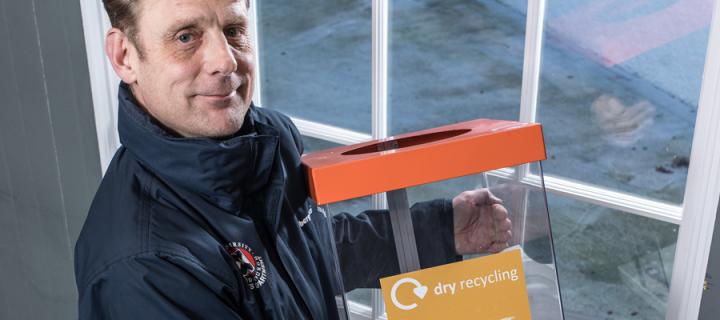Waste and reuse
Since the end of March 2020, the numbers of staff and students on campus reduced drastically due to Covid-19 pandemic, and this has had an impact on the amount of waste being produced across the academic estate for this academic year.
Waste

Across the University’s managed student accommodation at Pollock Halls, the increase in waste arising per student can be attributed to all shopping undertaken by students during this period being online resulting in excessive amounts of packaging.
During the period there was a huge amount of online food and drink deliveries throughout the day to Pollock Halls.
Students in isolation created waste, some of which would have usually been sent as recycling, but this had to be sent as general.
Reuse
The PC Reuse Project at the University has been repurposing computers and IT equipment since 2015. More than 2,100 computers have been donated to charities and community groups in Edinburgh and the wider area, since it launched in 2015.
News: The IT Reuse project is back in action
Over the last year, the University has worked with Midlothian Council and the Edinburgh Remakery to donate computers and laptops to local schools and community groups, who will then distribute to local families.
The University’s licensed Waste Electrical and Electronic Equipment (WEEE) contractor, collected nearly 6,300 items of WEEE across the estate in 2020/21, compared to 7,200 in 2019/20, which equates to approximately 57 tonnes. The contractor continues to focus on reuse, and in 2020/21 approximately 9 per cent of WEEE was reused.
Warp It, the University’s reuse portal, achieved savings of approximately £70,000 and four tonnes of avoided waste. This is down compared to 2019/20, with savings of £95,000 and six tonnes of waste avoided.
The University’s Accommodation, Catering and Events continued its successful partnership with the British Heart Foundation. Even with the pandemic and limited access and uplift, their end of term collections were successful, collecting 1,332 bags which included 10.6 tonnes of avoided waste and the goods were worth £18,648 to the British Heart Foundation.
Topic: waste and the circular economy
Academic estate waste
Use the arrow to scroll through to see data on reuse, recycling and composting, anaerobic digestion and waste diverted from landfill.
ACE managed student accommodation at Pollock Halls
Use the arrow to scroll through to see data on reuse, recycling and composting, anaerobic digestion and waste diverted from landfill.
ACE managed student catering at Pollock Halls
Use the arrow to scroll through to see data on recycling and composting, anaerobic digestion and waste diverted from landfill.

